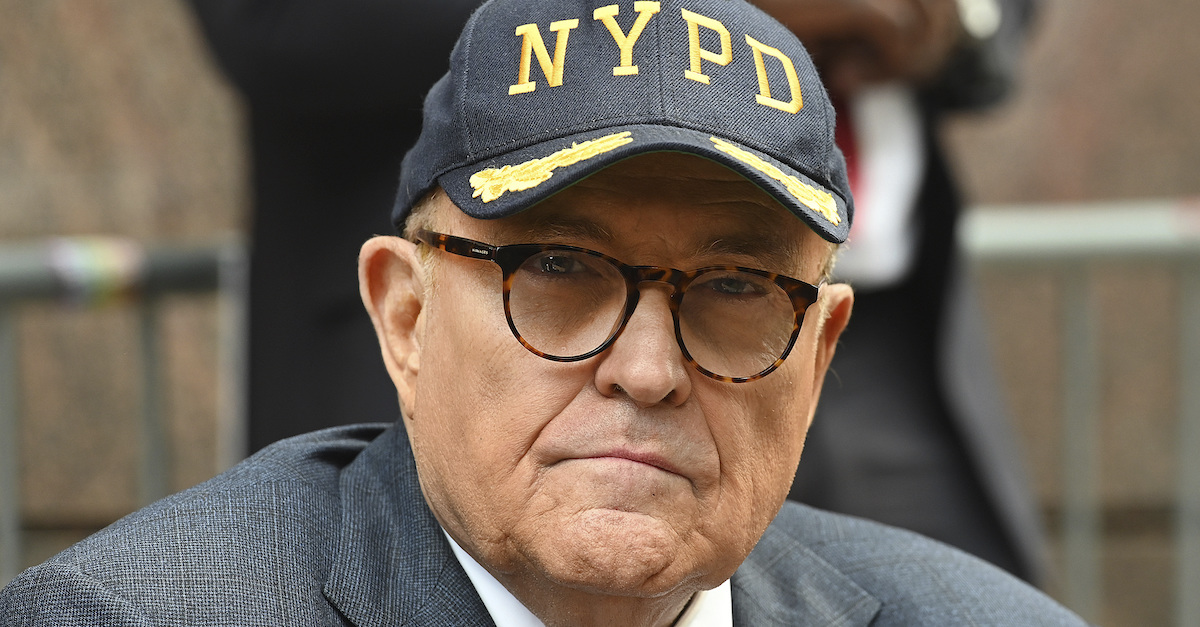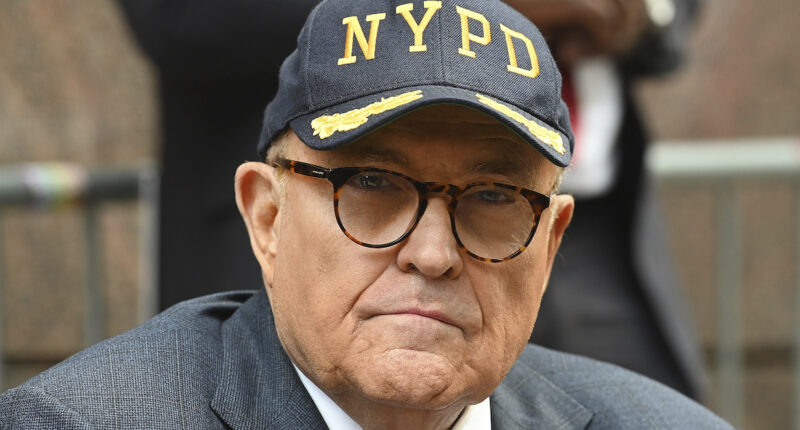
1
In a series of documents filed in court on Christmas Eve, Rudy Giuliani implored a federal judge not to hold him in contempt.
The effort is part and parcel of the ongoing judgment phase in the former New York City mayor’s broader defamation lawsuit battle with two former Georgia election workers.
The latter fight, at the district court level at least, is lost. Giuliani owes Ruby Freeman and her daughter Wandrea ArShaye “Shaye” Moss a combined $148 million for defaming them in a series of flagrantly false comments about the 2020 election.
Now, the defendant is aiming to keep certain pieces of property under the ownership and control of his family – while avoiding the ire of, and punishment from, the judge overseeing the matter.
Earlier this month, U.S. District Judge Lewis Liman set a civil contempt hearing for Jan. 3; the proceedings will be a bit of an omnibus meeting intent on dealing with various motions filed by both parties.
Throughout October and November, Freeman and Moss accused Giuliani of violating various court orders – and asked for him to be sanctioned and held in contempt. Some of those alleged violations include ignoring discovery requests and failing to abide by deadlines related to those requests. The plaintiffs also allege the defendant has refused to turn over delineated pieces of personal property that could be used to satisfy part of the multimillion dollar debt owed.
In turn, Giuliani now says Freeman and Moss are not legally entitled to receive any of his property because they failed to file an oath required by the rules governing lawsuits in the Empire State.
The latest motion cites the rule, at length:
Oath. A temporary receiver, before entering upon his duties, shall be sworn faithfully and fairly to discharge the trust committed to him. The oath may be administered by any person authorized to take acknowledgments of deeds by the real property law. The oath may be waived upon consent of all parties.
Giuliani says he did not waive the oath requirement and that neither Freeman nor Moss requested such a waiver.
“Hence, the receivership has not yet technically or legally begun,” the motion reads. “The Oath was required to be signed by Plaintiff Ruby Freeman and Plaintiff Wandrea’ Moss as the receivers and an oath must have been administered by any person authorized to take acknowledgment of deeds by the real property law of New York State, and then filed with the Court before the Plaintiffs undertook the duties as Receivers. Even if the Plaintiffs could have filed the Oath at any time, the Plaintiffs failed to do so. It appears that the Plaintiffs as receivers have never been permitted under law to act as receivers as Plaintiff Ruby Freeman and Plaintiff Wandrea’ Moss apparently have not taken oaths, signed oaths, had the oaths notarized or acknowledged, and filed the oaths with the Court as required.”
The former federal prosecutor’s latest filing says the lack of such an oath “appears” to be the state of play “according to the Court docket.”
“Under applicable law, Plaintiff Ruby Freeman and Plaintiff Wandrea’ Moss should not be permitted to act and cannot act as receivers at this time or until oaths are properly executed and filed with the Court,” the motion goes on. “Only then, under applicable law, should Plaintiff Ruby Freeman and Plaintiff Wandrea’ Moss be permitted to act as court appointed receivers.”
The motion cites precedent in service of its argument:
The Second Department of the New York Appellate Division has held that a receiver is not entitled to receive rents until “qualified.” See, e.g., 570 Kosciusko Realty Corp. v. Kingdale Estates, Inc., 256 A.D. 997, 10 N.Y.S.2d 700 (2d Dept 1939), appeal denied, 280 N.Y. 811; Manufacturers’ Trust Co. v. Sadenet Realty, Inc., 234 A.D. 893, 254 N.Y.S. 428 (2d Dept 1931). To this date, Plaintiffs have not “qualified” as receivers because they failed to file oaths required by CPLR § 6402.
The filing also has a message for how the court has conducted itself: “Until the Plaintiffs file oaths pursuant to CPLR § 6402 to act as the receivers, the Court should not have Ordered the Defendant to turn over any property to the Plaintiffs as the receivers.”
Giuliani additionally says that he has, in fact, complied with several discovery requests – since his lawyers were replaced in November.
“As this Court has seen, once Defendant’s prior counsel withdrew as counsel on November 26, 2024, present counsel for Defendant ensured nearly full compliance with all of the court orders capable of being complied with,” the motion goes on.
In December 2023, Freeman and Moss won a $148 million default defamation verdict over a campaign against the women in which Giuliani falsely proclaimed the pair were engaged in fraud and had “cheated” voters during the 2020 presidential election.
The pair have since been engaged in various forms of litigation to avail their monetary interests against the onetime federal prosecutor — including a recent series of Requests for Production of Documents (RFPs) aimed at prying away relevant financial information.
The plaintiffs say Giuliani has not been forthcoming — even after two consecutive Liman-issued orders regarding those requests.
Those orders were issued by the court on Oct. 28 and Nov. 22. The first order directed the defendant to expediently reply to discovery requests and set deadlines for such replies. After the first deadline was missed, the court set another deadline for Giuliani to explain himself and avoid being held in contempt. After that second deadline whooshed by, Freeman and Moss asked Liman to step back in.
Giuliani now claims, deadlines or not, the plaintiffs have not actually suffered any real losses due to the extant schedule.
“In the instant case, there has been no delay, as this Court is holding the trial on January 16, 2025, and the discovery in this case has been ordered to be very expedited and there has been no delays by Defendant which caused Plaintiff to incur additional costs pursuing the action and no sanctions should apply,” the motion argues.











